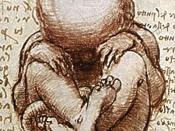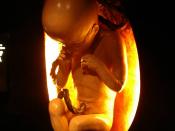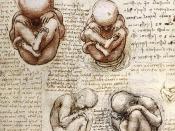The universal appeal of Bruce Dawe's poems lie in the poet's passion in speaking for those who have no means of speaking. In "The Wholly Innocent" Dawe challenges his readers through a wilful determination to terminate the pregnancy of a healthy foetus. And in Homecoming Dawe questions the validity of war as he speaks of the untimely death of several adolescent boys who are brought home as dead soldiers. Through the use of persona in a dramatic monologue, vivid imagery, onomatopoeia, deliberate repetition and other poetic techniques Dawe reaches the moral conscience of his readers to the wrongness of terminating life prematurely whatever the reason for it may be.
The penetrating imagery of a womb that could become a tomb if abortion is carried out in "The Wholly Innocent" will unnerve any reader contemplating terminating a pregnancy or any institution that is pro-abortion. The fact that the unborn foetus is ashamed to feel that he is a part of the "doomed race whose death cell was the womb" evokes untold pity for the defenceless life trapped in his own mother's womb.
The persona also highlights that all he wants is to experience the simple things in life like to "rejoice at sun or star". Most readers would believe that it is a universal right for all individuals to see these basic components of nature that we usually take for granted. He also claims through powerful imagery that he never experienced parental love in the line, "I never...knew the sovereign touch of care." Moreover, the persona uses a simile that he will die "anonymous as mud" if nobody protects him. The foetus also uses a biblical allusion comparing himself to a defenceless lamb which certainly evokes untold feelings of pity and sympathy in the reader. Dawe's main aim in...


